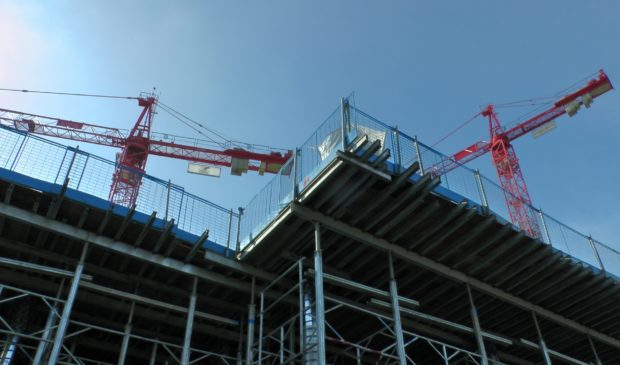Council passes resolution to ease regulations on affordable housing projects
Friday, February 22, 2019 by
Jack Craver City Council unanimously approved a resolution Thursday aimed at producing more affordable housing units in the city by easing regulations on subsidized developments.
The resolution, authored by Council Member Greg Casar, instructs city staff to draft an ordinance that will exempt affordable housing projects from a number of key city development regulations. Those include parking requirements, compatibility standards, design standards and limitations on the development’s floor area ratio.
Eligible projects would also be entitled to greater height and density than allowed by the property’s zoning. Projects with fewer than 12 units will be able to go through a modified site plan process that would be quicker and cheaper than usual.
At a press conference in City Hall before the Council meeting, Casar was joined by the three other Council members who represent districts in the eastern crescent, which include the highest populations of low-income people and people of color.
“Districts like ours not only struggle but could cease to exist if we don’t take housing justice seriously,” said Casar.
Also lending support, both at the press conference and in remarks to Council, were representatives of developers that specialize in affordable housing. Those include nonprofit organizations, such as Foundation Communities and Habitat for Humanity, as well as for-profit builders.
Both nonprofit and for-profit affordable housing developers tend to build housing that is financed by a combination of federal and local subsidies, notably the federal Low-Income Housing Tax Credits and funds from city housing bonds, such as the $250 million bond voters approved in November.
By reducing regulations on affordable housing projects, the city hopes to get more units in return for the bond funds it is investing.
Megan Lasch of Saigebrook Development, a for-profit affordable housing builder, said that the reduced regulations will “help us be good stewards of the funding.”
Casar has highlighted one of Saigebrook’s projects in Travis Heights as the poster child for the problems with the city’s current rules. The Aria Grand apartment complex will include 70 units, 60 of which will be provided at below market rates.
Similarly, Rachel Stone, assistant executive director of the Guadalupe Neighborhood Development Corporation, said that her organization was developing a project to serve “very low-income seniors” who are homebound. Few of the future residents will have cars, said Stone, but the current parking requirements would mandate the organization to build substantial parking, using up funds and space that could instead be dedicated to housing.
The resolution that was approved states that only developments where at least half of the units are “affordable,” (either 60 percent median family income for rental units or 80 percent MFI for ownership units) are eligible for the waivers. It is highly unlikely that any unsubsidized projects will qualify for the program. Instead, the projects that will benefit from the waivers are subsidized housing developments where the great majority of the units are income-restricted.
The resolution also states that at least a quarter of the units in eligible developments must include more than one bedroom. Council Member Kathie Tovo proposed an amendment to raise the requirement to 50 percent, but Casar thought that was too restrictive. He proposed instead that developments that provide that many multi-bedroom units be eligible for an additional bonus allowing even greater height and density. Tovo ultimately accepted Casar’s proposal “in the interest of moving (the resolution) forward.”
Similarly, developments can earn the additional bonus if at least 10 percent of their units serve very low-income households at 30 percent MFI or if they are located within ¼ mile of an Imagine Austin corridor with regular transit service.
The resolution instructs city staff to bring an ordinance with the necessary code changes to Council by May 9.
The Austin Monitor’s work is made possible by donations from the community. Though our reporting covers donors from time to time, we are careful to keep business and editorial efforts separate while maintaining transparency. A complete list of donors is available here, and our code of ethics is explained here.
You're a community leader
And we’re honored you look to us for serious, in-depth news. You know a strong community needs local and dedicated watchdog reporting. We’re here for you and that won’t change. Now will you take the powerful next step and support our nonprofit news organization?









